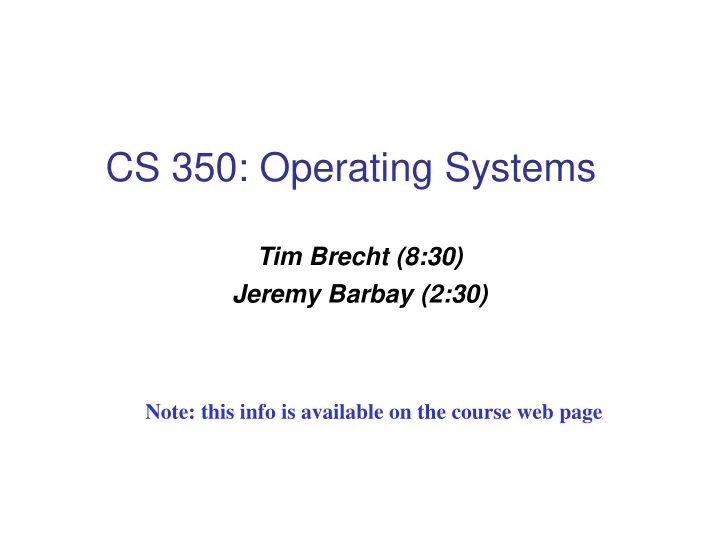

CS 350: Operating Systems Tim Brecht (8:30) Jeremy Barbay (2:30) Note: this info is available on the course web page
Course Objective • This course provides an introduction to operating systems; what they do, how they are used, and how they are implemented 0-2
Course Modules • Module 1: Processes • Module 2: Synchronization • Module 3: Memory Management • Module 4: NachOS • Module 5: Virtual Memory • Module 6: Scheduling • Module 7: Input/Output • Module 8: File Systems • Module 9: Interprocess Communication • Module 10: Security 0-3
Course Information • Intended Audience: – CS 350 is a required course for all CS majors • Related Courses: – Prerequisites: CS 240, 246, 251 and enrollment in a CS major plan – Successors: CS 343 (Concurrency and Parallel Programming) and many 4th year courses – Antirequisites: CS 354, E&CE 354, GENE 241 0-4
Course Personnel • Instructional Support Coordinator (ISC) – Fenglian Qui – Organizes and manages TAs, assignment marking, web page, grades, etc. • Instructional Apprentice (IA) – Claus Spitzer and Qiang Wang – Will answer newsgroup questions, NachOS problems • Other TAs (see course web page) • All office hours will be posted to newsgroup 0-5
Course Documents • Textbook – Silberschatz, Galvin, and Gagne, Operating System Concepts , Wiley & Sons. • Officially, the 7th edition (with or without the XP update) • The 6th edition is fine as well (as is likely the 5th) • Course Home Page: – http://www.student.cs.uwaterloo.ca/~cs350 – Includes all notes and slides, which can also be purchased • Course Newsgroup: – uw.cs.cs350 – All students expected to read newsgroup frequently – Post questions regarding assignments (instead of emailing) 0-6
Administrivia - Grading • Components: • A1, A2, A3: Mark on assignments 1 - 3, as a percentage • M: Midterm exam grade, as a percentage • F: Final exam grade, as a percentage • Grade computation: Normal = (0.1*A1 + 0.15*A2 + 0.1*A3) + 0.2*M + 0.45*F Exams = (0.2*M + 0.45*F) / 0.65 Assigns = (0.1*A1 + 0.15*A2 + 0.1*A3) / 0.35 If (Exams < 0.5) Grade = min(Normal, Exams) Else Grade = Normal 0-7
Administrivia - Exams • Midterm exam – Tentatively scheduled for the evening of Tuesday, Feb. 27, location TBA – Notify your instructor if you have a conflict • Final exam – Details will be announced when available • Reappraisals – Resubmit you entire exam/assignment for remarking (time limit on all reappraisals) 0-8
Administrivia - Assignments • Assignments will be done in groups of up to three students (really a year long project) – You can work alone or in smaller groups, though we recommend three – Grading is independent of group size – Assignment 0: Form your group • Try a “Partner wanted” message on the course newsgroup if you are trying to find a partner • Partners need not be in the same lecture section – Also note the policies for “divorce” 0-9
Administrivia - Assignments • Assignments have a number of slip days – Submit an assignment late without penalty – You have a fixed number of days that you can use – Exception: last assignment cannot be submitted after the last day of classes • Reappraisals – Contact the TA who marked it. They can explain the marking. – Follow reappraisal procedure on web page. 0-10
Administrivia - Assignments • All assignments will be done with NachOS – Simulates an operating system running on a MIPS-based workstation – This has been modified for use at Waterloo. • Download a new version once available through web site • NachOS code base is 10,000 lines of C++ – Large code base to learn and work with, so… 0-11
Administrivia - Assignments START ASSIGNMENTS EARLY! • Assignment 1 will be available shortly. Put together a group and start soon! • We’re not going to ease into the term - we’re jumping right in! 0-12
Administrivia - Assignments • NachOS will run on Linux systems, so you can work at home – You must ensure that your assignments work in the CSCF environment, since that’s where it will be marked. • Make sure you read and understand what must be submitted for each assignment – Part of assignment is demonstrating that it works. Guidelines for producing good tests will be provided on web site. 0-13
Plagiarism and academic offenses • Don’t think we won’t report problems just because you’ve made it to third year! • Minus 100% on the assignment makes it hard to pass the course • Nice explanation of plagiarism on-line http://arts.uwaterloo.ca/arts/ugrad/academic_responsibilty.html • Read this and understand it – Ignorance is no excuse! – Questions should be brought to one of the instructors • Plagiarism applies to both text and code • You are free (even encouraged) to exchange ideas, but no sharing code 0-14
Plagiarism (2) • Common mistakes – Excess collaboration with other groups • Share ideas, but no design or code! – Using code from other sources (like previous offerings of this course, your own code from) • We will be comparing assignment submissions using cheat detection software • Possible penalties – First offense • - 100% for that part of the course • This makes it hard to pass the course • You can not drop the course with an academic offense – Second offense • Expulsion is possible 0-15
Recommend
More recommend